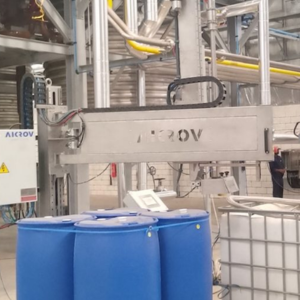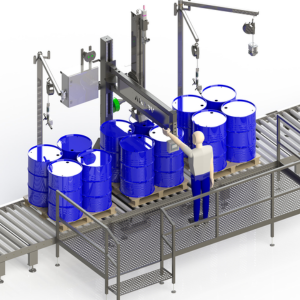Based in Barcelona, Spain, AiCROV specializes in the design and manufacturing of industrial liquid filling solutions. Since 2006, their team has combined nearly two decades of expertise in the filling sector with over 25 years in automation to deliver high-performance, tailor-made equipment for customers worldwide.
AiCROV’s portfolio includes automatic and semi-automatic systems designed for filling drums, jerrycans, IBCs, and industrial containers ranging from 1 to 1,500 litres. Their Smart Filling philosophy emphasizes precision, safety, and efficiency while meeting the highest standards of quality, sustainability, and reliability.
Beyond machinery, AiCROV provides complete, customized solutions, helping manufacturers modernize operations, increase safety, and streamline production through smart automation. With a customer-centric mindset, proven industry know-how, and a commitment to long-term support, AiCROV stands as a trusted partner dedicated to advancing productivity and performance across every stage of the filling process.
ATEX-Certified Liquid Filling Solutions for Large Containers
SP2 Semi-Automatic Drum and IBC Weight Filler
Semi-Automatic Drum and Tote Filling Equipment
Industries Served by AiCROV Filling Equipment
Chemical and Petrochemical Industry Solutions
Paint and Coatings Industry Equipment
Food and Beverage Filling Systems
Industry-Specific Applications for DRUM & IBC Filling Machines
Industrial filling, dispensing, and packaging lines face unique constraints depending on the materials processed. That’s why choosing equipment engineered for industry-specific requirements is essential for safety, productivity, and long-term reliability.
Chemical industry requirements demand robust, corrosion-resistant machinery capable of handling aggressive substances, variable pH levels, and flammable or reactive materials. In this sector, equipment must integrate sealed enclosures, explosion-proof components when needed, and precise dosing systems that reduce operator exposure while maintaining product integrity. Automated weight- or volume-controlled systems help facilities remain compliant with strict environmental and safety regulations, especially when dealing with acids, detergents, solvents, or specialty chemicals.
In the food and beverage industry, compliance revolves around sanitation, traceability, and hygienic design. Machines must incorporate food-grade materials, smooth welds, and easy-to-clean surfaces to prevent contamination. Consistent fill accuracy is equally critical. No matter the product: edible oils, sauces, beverages, or semi-viscous products, overfill increases operational cost while underfill can lead to regulatory penalties. Equipment that supports CIP (Clean-in-Place) capability, allergen control, and batch-tracking ensures manufacturers meet global standards such as CFIA, FDA, and HACCP.
Operations in the petrochemical sector require equipment designed for high-risk environments where flammability and vapor control are paramount. Systems must meet stringent petrochemical safety standards, including ATEX or Class/Division certifications, to protect workers and prevent ignition sources. High-accuracy filling also minimizes product loss and environmental hazards when working with lubricants, fuels, and volatile hydrocarbons.
Finally, paint and coatings viscosity handling introduces another layer of complexity. These products often thicken, separate, or cling to surfaces, demanding specialized nozzles, controlled flow rates, anti-drip systems, and agitation options. Equipment engineered to manage variable viscosity ensures consistent application, reduces waste, and keeps maintenance time to a minimum.
Across all sectors, industry-specific engineering ensures safer operations, higher throughput, and reliable performance no matter how challenging the product.
Semi-Automatic vs. Fully Automatic DRUM & IBC Filling Systems
Choosing the Right Fit
Selecting between semi-automatic and fully automatic systems is one of the most important decisions when designing a filling or packaging line, especially in sectors with strict requirements such as the chemical industry, food and beverage compliance, petrochemical safety standards, or paint and coatings viscosity handling.
Semi-automatic solutions work best for small to medium production volumes, frequent changeovers, and products that benefit from operator oversight. They offer excellent accuracy at a lower capital cost, making them ideal for specialty chemicals, or high-viscosity materials like paints and coatings. Operators can easily monitor tricky flows, foaming, or reactive materials during each fill cycle.
Fully automatic systems, on the other hand, are engineered for high-throughput, continuous production. They reduce manual labour, improve consistency, and help facilities maintain strict regulatory compliance, particularly important when handling flammable petrochemical products or allergen-sensitive food and beverage lines. Automation increases repeatability, reduces error rates, and delivers predictable output.
When to choose each solution depends on your growth stage. Semi-automatic systems suit operations that need flexibility. Fully automatic lines are ideal when demand increases and reliability becomes essential.
AiCROV Value Proposition
Adaptability is at the core of AiCORV’s approach. Each system is customized to meet unique client needs, carefully analysing factors such as container type, liquid properties, production goals, and regulations to recommend the most suitable technology. This ensures solutions that are precise, safe, and efficient. Beyond delivering equipment, AiCROV focusses on building long-term relationships based on trust, cooperation, and ongoing support, providing responsive, personalized service and reliable after-sales care.
Key Advantages of AiCROV Smart Filling Technology
- 100% European engineering and manufacturing
- International experience
- Compliance with international regulations (CE, ATEX Explosion Proof, UL, IECEX)
- Equipment designed to maximise safety, accuracy, and productivity
- Flexibility to integrate into existing industrial processes
- Guaranteed technical support and after-sales service
After-Sales Service and Technical Support
- On-site and remote technical assistance
- Assigned Project Manager
- Customised training
- Spare parts management
- Inspection and maintenance
Factory Acceptance Testing (FAT) and Site Acceptance Testing (SAT)
AiCROV carries out two types of technical verifications to ensure the highest quality
and reliability of their machines.
- Factory Acceptance Tests:
Customers are invited to AiCROV facilities in Tarragona, Spain, to technically validate their machine before shipment. During the FAT, static and dynamic
checks, safety inspections, and a trials with water are performed to ensure the machine operates according to specifications. Once the FAT is successfully completed, the machine is shipped to the customer’s site for installation. - Site Acceptance Test:
After installation and commissioning at the customer’s facility, the SAT is carried
out. This involves technical verifications at the location where the machine has
been installed, including efficiency tests. The number of tests depends on the
products, containers, and caps provided by the customer to ensure the machine
meets all operational requirements.
This two-step validation process guarantees that every AiCROV machine is fully tested,
safe, and ready for optimal performance.





